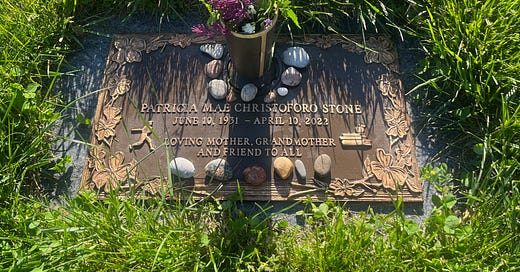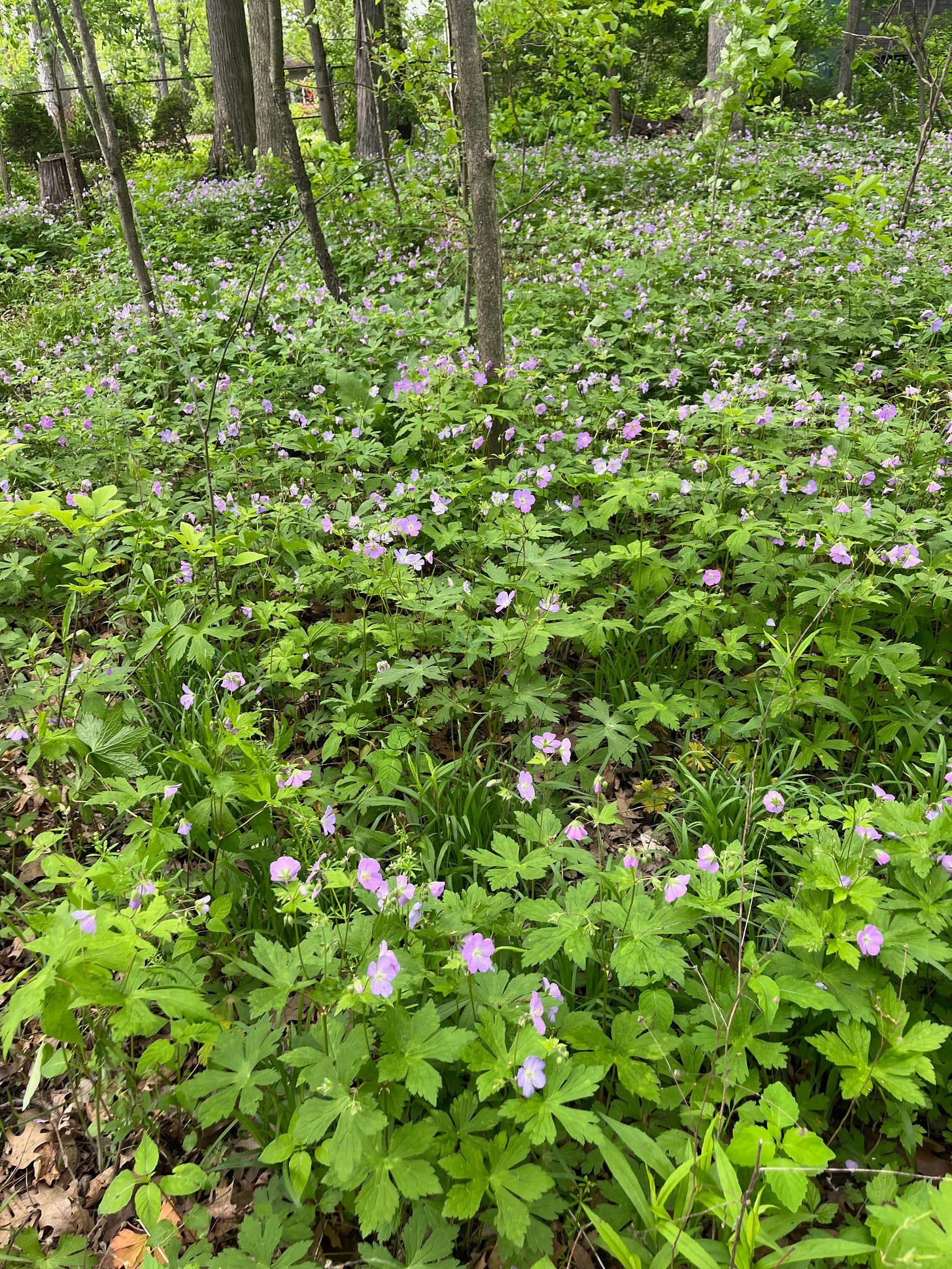I have always thought of spring as a time to bring what was inside out again, to open the house, ourselves to the greening of the world. As if we have grown dusty and pale all winter and need the sun desperately to go on living. In fact, we likely do! My father talked of growing up with no fresh greens from October until April. When the dandelions first sprouted, people rushed to gather and eat them because they had been deprived of greens all winter. He sent my brother and sisters and me out in the April air to gather their spears and fixed a salad of the greens coated in bits of fried salt pork and an apple cider vinegar dressing from the leftover fat in the cast iron frying pan that we ate ravenously. Sometimes, that is all we had for a spring supper with a loaf of our mother’s fresh bread from the oven.
I wonder if I reveled in the season of spring when I was young, if I even noticed the speed of the greening. I knew the delight of lily of the valley growing under the lilac bush. That place of perfume was one of my havens, where I disappeared when I was little, the soft curve of earth under me, spray of tiny, belled blooms rising from the dirt, above, a canopy of lavender lilac drooping above me like clouds gathering, puffs of plumes signaling hope, somehow. I think I disappeared there when I was scared or sad. I never wanted to leave.
In all her fickleness, her back and forth temperatures, drought or flood, spring seems to reject sadness, almost as if there is no room for it. A season selfish in its singular purpose, to grow at all costs. A teenager, spring. Only weeping when it rains—when the clouds are too much and overflow, like an adolescent overwhelmed by all that change.
But how can the time of greening silence a person? Mother’s Day evening, I realized that it is hardest for me to write about sadness. It is so much easier to write from frustration or anger. Even fear can sometimes get my blood flowing, and therefore, the pen. And so, I find myself wondering if that is what the catalyst for human cruelty is—sadness. Or human destruction, does it come from a deep well of grief? Almost as if we must reject grief’s hold on us, its tendency to flood us with loss, so much that we want to turn away from it. To burn it down or fight it.
For me, grief empties. It turns me hollow as if I must reject fullness. Reject spring, even, especially as it overtakes us with ferocity, with its fervor of green. No room for anything else.
Last Sunday, I picked wild geranium, lily of the valley and lilac from my yard and took them to my mother’s grave. The cemetery where she is buried is lined with trees on one side, fields on the other. Birds were hollering— a rose breasted grosbeak and a Western meadowlark included. My Granny’s favorite bird was the evening grosbeak, and the last time I saw a meadowlark was in Ann Arbor near my Project Grow garden in the late 1980s. The meadowlark was sitting on a fencepost singing. Apparently, they come to us in breeding season, and I likely saw a male, his distinctive yellow belly, his larger frame.
The meadowlark’s song is described as “buoyant, flutelike” by the Cornell Lab of Ornithology, and that is how I first felt kneeling down arranging the bouquet for my mother. The grass had grown deep and lush since the month before and the birds framed the moment with the swinging fullness of their concert. I paused— once I cleared off the gravestone and washed it as well as the small stones we have gathered there to commemorate my mother— to listen. The music of those birds— cardinals, red-winged blackbirds, robins, sparrows filled me up to overflowing. And then, for the first time that day, I felt inundated by my mother’s absence again.
I have thought about my mother’s loss in relation to seasons as there were many that we lost her. When she died at age 90, I also grieved the mother I first lost in her late 30s, later in her 50s and 60s when she left our home for good. May is mental health awareness month. I talked about this when I spoke at an Ann Arbor Indivisible rally against the proposed Republican Medicaid cuts last Monday. Vulnerable people like my mother need our attention, our care. They cannot advocate for themselves and will not always survive without us.
I did not read this poem at the rally, but it describes a time in spring when I first recognized how mental illness would be affecting my family for the rest of my life. It came in like an uninvited guest, but one we had to welcome and acknowledge it anyway:
Depression as guest In a picnic Polaroid down on the farm, all of us wince into the lemon light of May. The yard, new with green, table laid with Tupperware. You can’t see people much, but here the macaroni salad peeks out next to my sister stuffed in near Granny wearing pink in glasses pointy as triangles. We carry out what was inside all winter. Chairs, cabbage from the cold room – sliced thin folded into vinegar, Hellman’s, and fried chicken, rhubarb cake, Wise chips. And Mom is there, isn’t she? The halo of her hair somewhere. Dad, too, in his tee shirt. It’s Memorial Day. We spent the morning in the garden planting. It’s celebration time after Grant took flowers up to all the graves. And, somehow, this is when she comes to all the holidays, D. who stands off to the side, planted there like some odd tree. No one seems to question it. She is morose, buts she is family, so in she comes. And she sits down. Evermore, we add her in, her troubled stare. And rumpled clothes. She sleeps all day, then joins us. For the special days. So, holidays will never be the same. I understand it now. Along with joy, we have to think of her. Everybody Wants to Keep the Moon Inside Them Mayapple Press, 2025
And, so that is spring, the whole host of it. We hanker for it, and then, when it comes, our reactions are complicated. How will we ever be ready for it? How will we get through? As if it is both prize and curse. I walk the woods, eager to see what is coming, but already mourning what is lost. I miss my mother desperately at times. I worry what our nation is willing to settle for, who we are in our myopia, our longing and frustrations and fears. How we so easily set aside compassion, empathy for the other who we do not easily understand. I want to fight against our meanest impulses.
But those birds…they sing out, sending missives amid my settling into sadness, little envelopes of song. All spring, they tell me we go on, we must go on with joy, even, relentlessly. So, I follow them, little red eyed vireos in the trees, cheeky and fierce. My eyes flit from the tops of trees to the earth. The woods are now full of a wave of pinky purple blooms, a flow of wild geranium. It is so delicate, but it fills space like flanks of people appearing, sudden ghosts, reminding me. All these people under the trees, who are they? How can they be loved? Are we paying attention? What else can we do to hold and care for everyone? May reminds me that is perhaps our biggest job as humans— hold the earth in our hearts and love her like a mother, care for each other as if that is all that matters.
I will be reading at the Glen Lake Community Library in Empire, Michigan at 7 PM on Thursday night, May 29th along with some other wonderful northern Michigan poets. Thank you to Cottage Book Shop in Glen Arbor for selling our books that evening!






Got the book. It is lovely, lovely, lovely